Best Dog Foods for Adult and Puppy Newfoundlands
| The Scoop : Best Newfoundland Dog Foods of 2025 | |||
| Rank | Product | Price | Rating |
| Best Value |
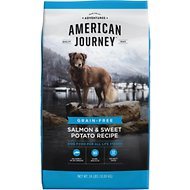 American Journey Salmon & Sweet Potato Recipe Grain-Free Dry | $1.49/lb |
A+
|
| Human Grade |
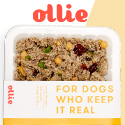 | Varies |
A+
|
| Most Popular |
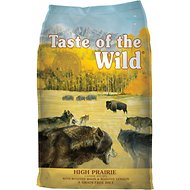 | $1.55/lb |
A+
|
| #1 |
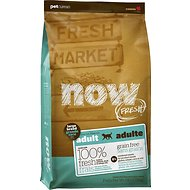 | $3.16/lb |
A+
|
| #2 |
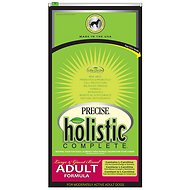 | $2.10/lb |
A+
|
Quick Guide
Big and strong with a thick coat that protects him in cold water, the Newfoundland is famous as a water rescue dog. This giant breed originated in Canada as a working dog to help fishermen pull in their nets. Today they are known as gentle pets with a sweet temperament. You do need to feed the best Newfoundland food possible to provide the nutrition your dog needs.
Newfoundlands or “Newfies” are very good with children and they can make wonderful therapy dogs. The AKC recognizes Newfs in black, black and white (“Landseer”), gray, and brown. Learn what foods to feed a Newfoundland below.
Here are the 9 Best Foods to Feed an Adult and Puppy Labradoodle
Newfoundland Diet & Nutrition
Giant breeds like the Newfoundland usually do better when you feed them a good quality food formulated for large/giant breeds. Large/giant breed foods usually have slightly fewer calories to help these big dogs stay trim. Many of these breeds are especially prone to bone and joint problems so staying lean can help reduce the risk of problems like hip and elbow dysplasia. Foods formulated for large/giant breed dogs also have the correct nutrient ratios for bigger dogs. They may also include joint supplements such as glucosamine, chondroitin, SAMe, green lip mussels, and other things to help very large dogs avoid problems with arthritis and other joint conditions.
Like all dogs, Newfoundlands can have some health issues but most of them are not related to diet and nutrition. Newfs are one of the breeds that can be prone to bloat since they are a large breed with a deep chest cavity. When it occurs, bloat is a life-threatening condition and you should waste no time getting your dog to the vet. It is an EMERGENCY. We suggest that you feed your Newfoundland several small meals per day instead of one large meal. A slow feed bowl can also encourage a dog to eat more slowly and not gulp in air when he eats. You can find out more about bloat here.
Allergies and food sensitivities are not recognized as a breed-specific problem in Newfoundlands but they can affect individual dogs. If your Newf shows signs of a food allergy or food sensitivity, it’s a good idea to talk to your vet. She may suggest an elimination diet and food trial to identify the allergens that affect your dog. Or, if your dog’s trigger is obvious, you may try to simply avoid the foods that contain that ingredient. The most common dog food allergens today are: beef, dairy products, chicken, lamb, fish, chicken eggs, corn, wheat, and soy. These are also some of the most common dog food ingredients today so it’s not always easy to avoid them. You may need to look for a limited ingredient or hypoallergenic dog food. If your Newf has a serious food allergy and you are having trouble finding a food he can eat, talk to your vet about a prescription or veterinary diet.
It’s also a good idea for large/giant breed puppies like Newfoundland puppies to eat a large breed puppy food while they are growing – and Newf puppies can grow for a long time. Their growth plates continue growing until they are about two years old. Large/giant breed puppies can grow fast, they can grow at an uneven rate, and they can be gangly. Because of their size, weight, and growth, puppies can be subject to some development bone problems as they grow, such as osteochondritis dissecans (OCD). Large/giant breed puppy foods that encourage slow growth can be helpful in avoiding these problems.
How Much Should You Feed Your Newfoundland?
How much you feed your Newfoundland depends on several factors:
- How active is your Newf?
- How much does your dog weigh?
- How old is your dog?
- Is your dog spayed/neutered?
- What food are you feeding
- What is your dog’s overall health like?
Just like people, different dogs have different metabolic rates. Large/giant dogs like Newfoundlands usually need about 20 calories per pound of body weight per day. This is true even if your dog is only getting mild exercise at home. If your dog gets to have some time swimming (which Newfies love) or getting a chance to romp with you, he will need more calories.
After you have considered your dog’s specific requirements, you will still need to consider the food you are feeding. If you are feeding a premium dog food you can usually feed less food than if you are feeding a lower quality food. Better quality dog foods usually have better quality ingredients. This means their nutrients are more bioavailable to your dog. “Bioavailable” simply means that the nutrients can be easily absorbed and used by your dog’s body. Poor quality ingredients have fewer nutrients or they have nutrients that your dog can’t use very easily. For example, a rawhide has some protein, fat, and fiber, as well as calories, but it wouldn’t provide a very good diet for your dog. The same is true with some of the ingredients used in lower quality dog foods.
You do need to pay attention to the calories in your dog’s food, especially if you are changing foods. You may be used to feeding your dog four cups of one dog food but when you change to a new food, with more calories, if you continue to give your dog four cups he will quickly gain weight. Check the calories on the label to see how many calories the food contains and figure out how much food your dog needs.
How Many Calories Does My Newfoundland Need?
Adult male Newfoundlands can weigh up to 150 pounds; and adult female Newfoundlands can weigh up to 120 pounds. Based on recommendations from the National Research Council of the National Academies, the group that researches and make nutritional recommendations for dogs and cats, if your Newfoundland weighs 120 pounds you would need to feed him about 2529 calories per day. If he’s neutered or very inactive, you would need to decrease his calories so he wouldn’t put on extra weight. And, if he’s very active – say, competing in agility, drafting, water sports, or weight pulls (Newfs can do a lot of things!), he would need even more calories.
These are only suggested calories. You always need to watch your dog to see if he’s gaining or losing weight with the amount of food you’re giving him. You can adjust the amount as necessary. Many people like to put their hands on their dog to see if they can feel the dog’s ribs. Ideally, you should be able to feel the ribs without seeing them. Dog food companies are now supposed to include calories information on food labels, though it can be hard to find this information. If you have trouble finding it, check the company’s web site. It is usually located with the feeding recommendations.
What To Look For In A Good Newfoundland Food
When choosing a good dog food for your Newfoundland, look for the following:
Good Sources of Protein – Newfoundlands need good sources of animal protein in their diet such as poultry, meat, fish, and eggs. Protein helps build muscle, repair cells, and keep your dog’s skin and coat healthy. We recommend that you look for several sources of animal protein in the first few ingredients of a dog food. Most people like for the first couple of ingredients to be meat proteins unless your dog has a health issue that requires a special food.
Plant protein such as peas and lentils makes up a lot of protein in dog foods today, even in some otherwise good quality foods. Some plant protein is acceptable in a food but animal sources are better. Dogs can absorb the nutrients in animal protein more easily than from plant protein. We recommend that you check foods to see how much plant protein they contain. If they have lots of plant protein, look for a food that has more animal protein.
Whole meats and meat meals are both good sources of meat protein for your dog. Some people prefer whole meats such as whole chicken to a meat meal such as chicken meal. Chicken meal actually has much more meat protein than whole chicken since whole chicken is mostly moisture. Once the moisture is removed from a whole meat, the ingredient would be placed much lower in the ingredient list. If you really like a whole meat as the first ingredient in a food, look for one that has a good named meat meal next to it in the ingredient list so you know the food has plenty of meat protein.
Good Sources of Fat – Your Newfoundland also needs good sources of fat in his diet. Fat provides essential fatty acids (EFA) and helps distribute the fat soluble vitamins A, D, E, and K. Your dog absorbs fat from animal sources like fish oil and chicken fat better than from plant oils.
Named Ingredients – Look for named ingredients in your dog’s food and avoid generic ingredients. With generic ingredients you don’t really know what you’re feeding your dog. The ingredient could be something undesirable. The more specific the ingredient is, the better. For example, chicken meal is better than “meat meal.” Chicken fat is better than “animal fat.”
Low to Moderate Carbohydrates – Many dog foods today have more carbohydrates than you would imagine. This is true even with good quality foods and with grain free foods since many of them use high-carb ingredients such as sweet potatoes, potatoes, and tapioca to take the place of grains.
You don’t have to avoid all carbohydrates but look for dog foods that are low to moderate in carbs. Dog food companies are not required to provide carbohydrate information. To find this information you can contact the company; check dog food reviews such as those on Pawster; or do the math yourself.
Avoid Lower Quality Ingredients – Lower quality ingredients can include things such as meat digest or animal digest; unnamed meat by-products; and corn and wheat gluten. Other ingredients are debatable, depending on who you ask. For example, we think tomato pomace and beet pulp can be good ingredients in dog foods. On some sites you will find them listed as filler ingredients. Other sites like peas and lentils but we don’t like them as much.
Avoid Artificial Preservatives, Colors, and Sweeteners – Artificial preservatives and colors/dyes have been linked to various health problems in humans and animals. You should avoid these ingredients in dog foods. Your dog doesn’t need any kind of artificial sweetener. Other sweeteners are sometimes added to dog foods to make the food more palatable to dogs.
AAFCO – AAFCO is the Association of American Feed Control Officials. AAFCO sets voluntary standards for pet food labeling. Look for foods that have met AAFCO’s minimum standards. You can recognize these foods by the nutritional adequacy statements on the label such as “X Recipe is formulated to meet the nutritional levels established by the AAFCO Dog Food Nutrient Profiles for maintenance.” Foods can also meet AAFCO standards by food trials. Other statements may say that the food is for “All Life Stages;” or for “Growth and Reproduction.”
Most dog food experts recommend that dogs need a diet that is relatively high in protein and moderate in fat. Healthy adult Newfoundlands should be able to eat this kind of diet but keep in mind that every dog is an individual. You should feed your dog the diet that suits him best.
Top 3 Best Foods To Feed An Adult Newfoundland
| Rank | Product | Price | Rating |
| Best Value |
 American Journey Salmon & Sweet Potato Recipe Grain-Free Dry | $1.49/lb |
A+
|
| Human Grade |
 | Varies |
A+
|
| Most Popular |
 | $1.55/lb |
A+
|
| #1 |
 | $3.16/lb |
A+
|
| #2 |
 | $2.10/lb |
A+
|
| #3 |
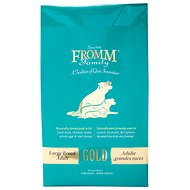 | $1.30/lb |
A
|
Now Fresh Grain Free Large Breed Adult Recipe
First 5 Ingredients : De-Boned Turkey, Whole Dried Egg, Potatoes, Peas, Potato Flour

Now Fresh Grain Free Large Breed Adult has moderate protein and the fat is on the low side. It has just 363 kcal/cup. Now Fresh uses 100 percent fresh turkey, salmon, and duck. The food has no grains, wheat, beef, corn, or soy, so it can also be a good choice for dogs with allergies or food sensitivities. It also has supplements for good hip and joint health. This food can be a good choice for Newfoundlands that are less active and don’t need as many calories.
Precise Holistic Complete Large & Giant Breed Adult
First 5 Ingredients : Chicken, Chicken Meal, Ground Brown Rice, Oatmeal, Chicken Fat

Precise Holistic Complete Large & Giant Breed Adult formula has triple proteins and the calcium and phosphorus levels have been adjusted for large breed adult dogs. The first five ingredients are: chicken, chicken meal, ground brown rice, oatmeal, and chicken fat (preserved with mixed tocopherols and ascorbyl palmitate). This food has moderate protein and fat with slightly more calories per cup than some large/giant breed foods (417 kcal/cup). Precise has a very good reputation for making foods for large/giant breeds.
Fromm Large Breed Adult Gold
First 5 Ingredients : Duck, Chicken meal, Chicken, Oatmeal, Pearled Barley

Fromm Large Breed Adult Gold has moderate protein and fat for your Newfoundland, along with moderate calories to keep him from gaining too much weight. The first five ingredients are: duck, chicken meal, chicken, oatmeal, and pearled barley. This food also has chicken cartilage as a natural form of glucosamine to help protect your Newf’s joints from hip dysplasia and arthritis. If your dog likes a grain free food, Fromm also makes Grain Free Heartland Gold Large Breed Adult with similar nutrient percentages and calories.
Top 3 Best Foods To Feed A Newfoundland Puppy
| Rank | Product | Price | Rating |
| #1 |
 | $2.00/lb |
A+
|
| #2 |
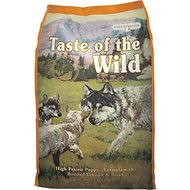 Taste of the Wild High Prairie Puppy Formula Grain-Free Dry Dog Food | $1.63/lb |
A+
|
| #3 |
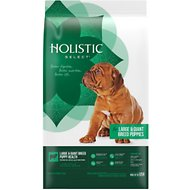 | $2.00/lb |
A
|
Precise Large & Giant Breed Puppy
First 5 Ingredients : Chicken, Chicken Meal, Ground Brown Rice, Oatmeal, Lamb Meal

Precise Large & Giant Breed Puppy is formulated for puppies that will grow to be more than 50 pounds as adults so Newfoundland puppies more than qualify! While the formula has fewer calories than many puppy foods, it still has 400 kcal/cup, which is plenty of calories for a large/giant breed puppy. These puppies should be encouraged to grow slowly. The food has three kinds of protein to help build solid muscle. It also has optimum calcium and phosphorus levels for large/giant breed puppies. The first five ingredients are: chicken, chicken meal, ground brown rice, oatmeal, and lamb meal.
Taste of the Wild High Prairie Puppy Formula Grain-Free Dry Dog Food
First 5 Ingredients : Buffalo, Lamb Meal, Sweet Potatoes, Egg Product, Pea Protein

This Taste of the Wild puppy formula has 370 kcal/cup. The first five ingredients are: Buffalo, Lamb Meal, Sweet Potatoes, Egg Product, Pea Protein. This food contains no corn, no wheat, no soy. It has probiotics, antioxidants, and omega-6 and omega-3 fatty acids. Taste of the Wild also makes canned food suitable for large breed puppies as well as another puppy formula with fish as the main protein source. Large/giant breed puppies like Newfies need to grow slowly and this High Prairie food would be a good choice.
Holistic Select Large & Giant Breed Puppy Health
First 5 Ingredients : Duck Meal, Brown Rice, Oats, Peas, Barley

DHA supports good brain and eye development and Holistic Select Large & Giant Breed Puppy formula provides this supplement to help your Newfie puppy. The first five ingredients in the food are: lamb meal, ground brown rice, ground white rice, chicken meal, and dried beet pulp. This formula has moderate calories – 375 kcal/cup. Holistic Select has other kibble and canned foods, including a grain free puppy formula that has higher protein and fat percentages.
We hope this information helps you choose the best food for your Newfoundland. These foods are only suggestions. Every dog is an individual. There are lots of good dog foods that your dog might be able to eat. Use these recommendations as a starting point and if you need more ideas check out our dog food reviews here on Pawster.











